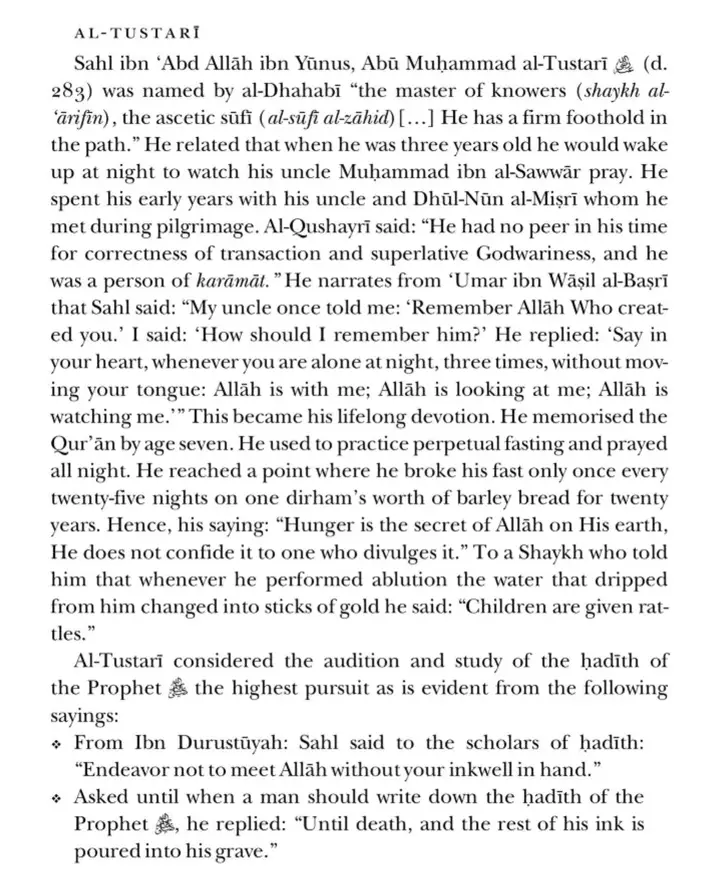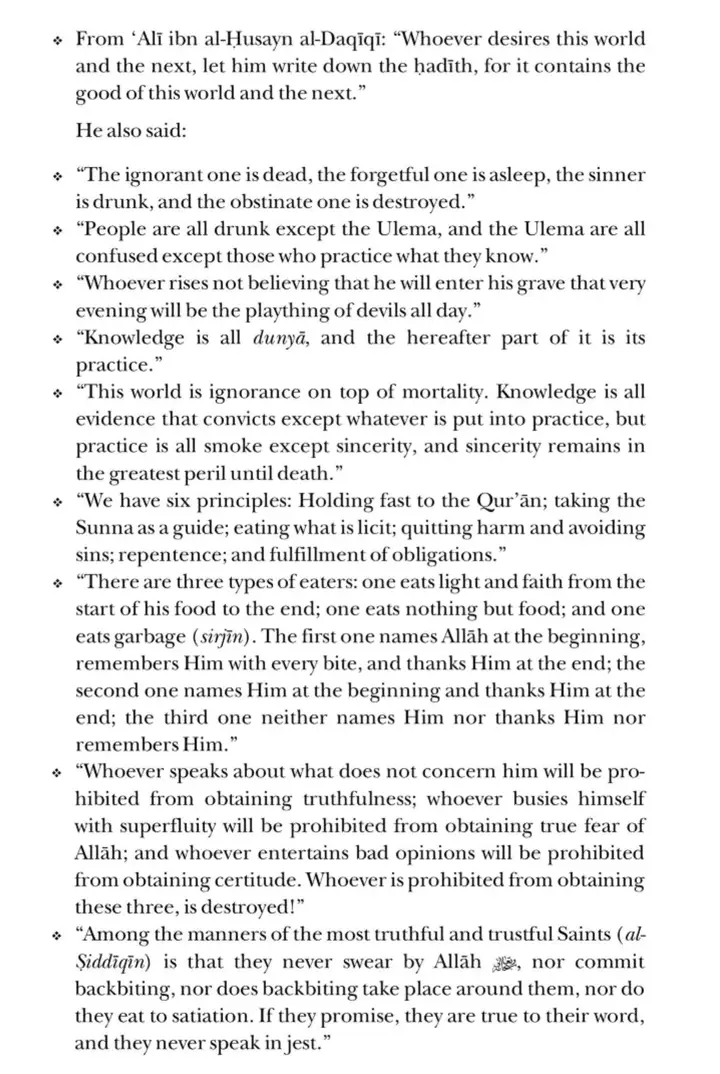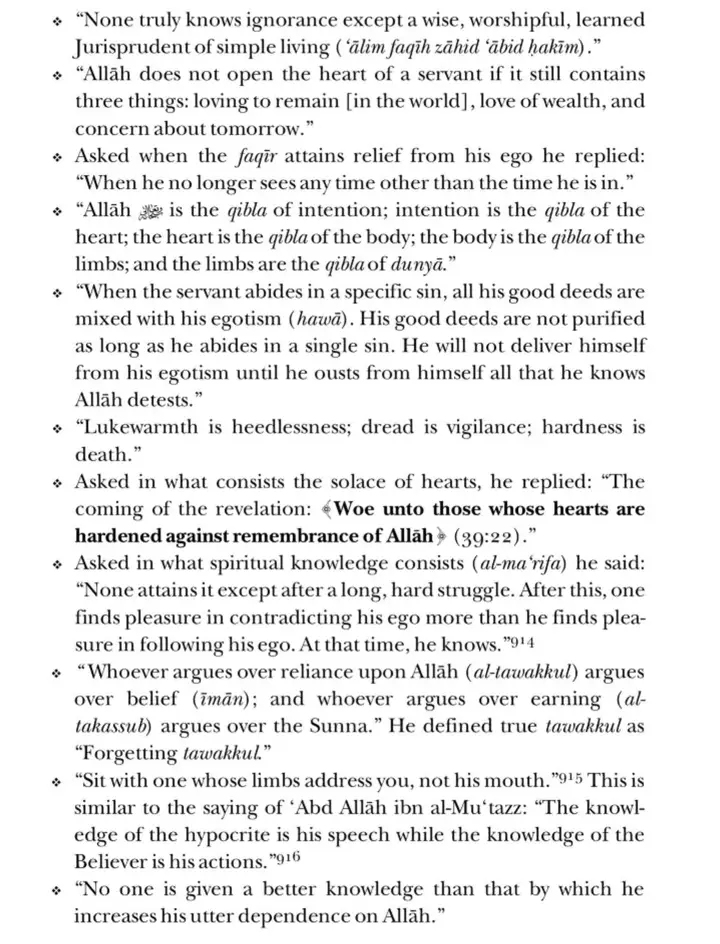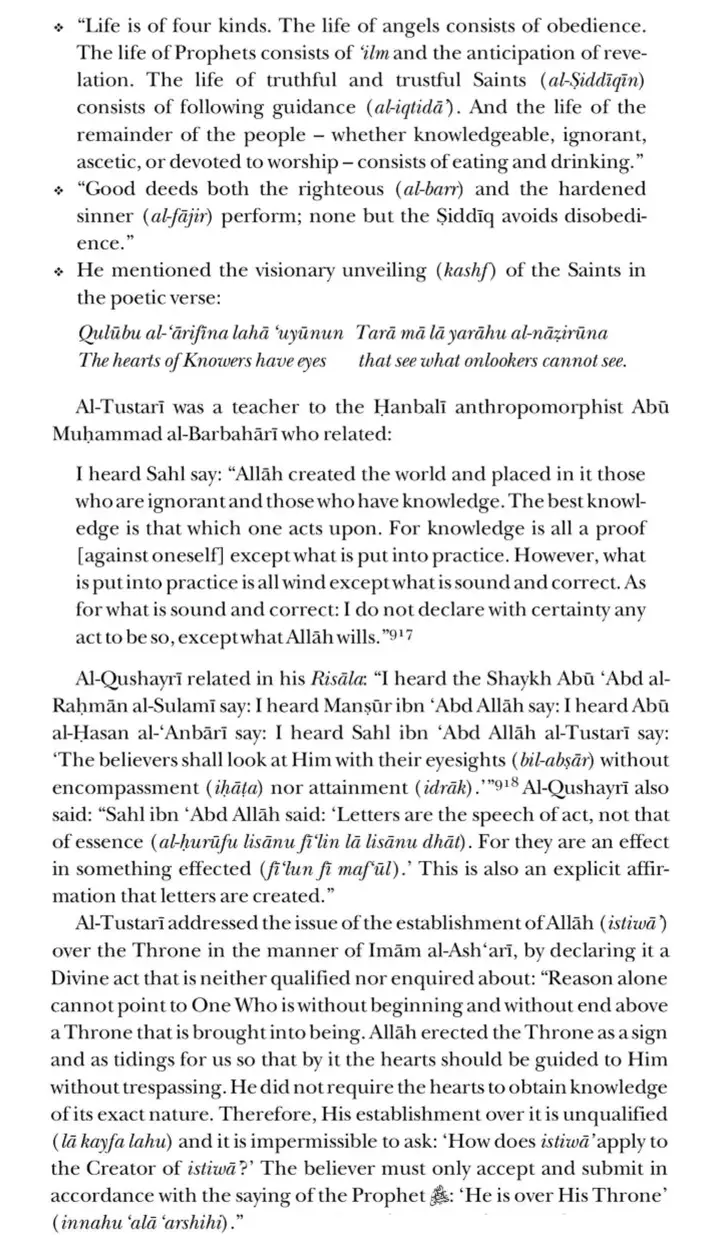
bit.ly/_tust
Sahl ibn ʿAbd Allah ibn Yunus, Abu Muhammad al-Tustari (d. 283), may Allah be well-pleased with him.
Named by al-Dhahabi "the master of knowers (Shaykh al-ʿārifīn), the ascetic sufi (al-Sūfī al-zāhid)... He has a firm foothold in the path." He related that when he was three years old he would wake up at night to watch his uncle Muhammad ibn al-Sawwar pray. He spent his early years with his uncle and Dhu al-Nun al-Misri whom he met during pilgrimage.
Al-Qushayri said: "He had no peer in his time for correctness of transaction and superlative Godwariness, and he was a person of karāmāt."
He narrates from ʿUmar ibn Wasil al-Basri that Sahl said: "My uncle once told me: ʿRemember Allah Who created you.' I said: ʿHow should I remember him?' He replied: ʿSay in your heart, whenever you are alone at night, three times, without moving your tongue: Allah is with me; Allah is looking at me; Allah is watching me.'"
This became his lifelong devotion. He memorized the Qur'an by the age of seven. He used to practice perpetual fasting and prayed all night. He reached a point where he broke his fast only once every twenty-five nights on one dirham's worth of barley bread for twenty years.
Hence his saying: "Hunger is Allah's secret on His earth. He does not confide it to one who divulges it." To a shaykh who told him that whenever he performed ablution the water that dripped from him changed into sticks of gold he said: "Children are given rattles." He also said:
1. "The ignorant one is dead, the forgetful one is asleep, the sinner is drunk, and the obstinate one is destroyed."
2. "We have six principles: Holding fast to the Qur'an; taking the Sunna as a guide; eating what is licit; quitting from harm and avoiding sins; repentence; fulfillment of obligations."
3. "Whoever speaks about what does not concern him will be prohibited from obtaining truthfulness; whoever busies himself with superfluity will be prohibited from obtaining true fear of Allah; and whoever entertains bad opinions will be prohibited from obtaining certitude. Whoever is prohibited from obtaining these three, he is destroyed."
4. "Among the manners of the most truthful and trustful saints (al-siddīqīn) is that they never swear by Allah, nor commit backbiting, nor does backbiting take place around them, nor do they eat to satiation. If they promise, they are true to their word, and they never speak in jest."
5. "None truly knows ignorance except a ʿālim faqīh zāhid ʿābid hakīm."
6. "Allah does not open the heart of a servant if it still contains three things: loving to remain [in the world], love of wealth, and concern about tomorrow."
7. Asked when the faqīr attains relief from his ego he replied: "When he no longer sees any time other than the time he is in."
8. "Allah is the qibla of intention; intention is the qibla of the heart; the heart is the qibla of the body; the body is the qibla of the limbs; and the limbs are the qibla of dunyā."
9. "When the servant abides in a specific sin, all his good deeds are admixed with his egotism (hawā). His good deeds are not purified as long as he abides in a single sin. He will not deliver himself from his egotism until he ousts from himself all that he knows to be abhorred by Allah."
10. "Lukewarmth is heedlessness; dread is vigilance; hardness is death."
11. Asked in what consisted the solace of hearts, he replied: "The coming of revelation: { Woe unto those whose hearts are hardened against remembrance of Allah } (39:22)."
12. "Whoever disputes reliance upon Allah (al-tawakkul), disputes belief (īmān); and whoever disputes earning (al-takassub), disputes the Sunna." He defined true tawakkul as "Forgetting tawakkul."
13. "Sit with one whose limbs address you, not his mouth." (1)
14. "Life is four kinds. The life of angels consists in obedience. The life of Prophets consists in ʿilm and the anticipation of revelation. The life of truthful and trustful saints (al-siddīqīn) consists in following guidance (al-iqtidā'). And the life of the remainder of the people - whether knowledgeable, ignorant, ascetic, or devoted to worship - consists in eating and drinking."
15. "Good deeds both the righteous (al-barr) and the disobedient (al-fājir) perform; none but the siddīq avoids disobedience."
16. He addressed the special insight of saints with the poetic verse:
Qulūb al-ʿārifīn lahā ʿuyūn
Tarā mā lā yarāhu al-nāzirūn
The hearts of Knowers have eyes
That see what onlookers cannot see.
Al-Tustari considered the audition and study of the hadith of the Prophet ﷺ the highest pursuit as is evident from the following sayings:
1. From Ibn Durustuyah: Sahl said to the scholars of hadith:
"Endeavor not to meet Allah except with your inkwell in hand."
2. To Abu Dawud: "Bring out for me your tongue with which you narrate the Prophet's ﷺ hadiths so that I may kiss it," whereupon Abu Dawud drew out his tongue and al-Tustari kissed it.
3. Asked until when should a man write down the hadith of the Prophet ﷺ, he replied: "Until death, and the rest of his ink is poured into his grave."
4. From ʿAli ibn al-Husayn al-Daqiqi: "Whoever desires this world and the next, let him write down the hadith, for it contains the good of this world and the next."
Al-Tustari addressed the issue of Allah's establishment (istiwā') over the Throne in the manner of Imam al-Ashʿari, by declaring it a divine act that is neither qualified nor enquired about: "Reason alone cannot point to One Who is without beginning and without end above a Throne that is brought into being. Allah erected the Throne as a sign and as tidings for us so that by it the hearts should be guided to Him without trespassing. He did not require the hearts to obtain knowledge of its exact nature. Therefore, His establishment over it is unqualified (lā kayfa lahu) and it is impermissible to ask: 'How does istiwā' apply to the Creator of istiwā'?' The believer must only accept and submit, due to the Prophet's saying: 'He is over His Throne' (2) (innahu ʿalā ʿarshihi)."
Al-Dhahabi quotes the above but expresses caution elsewhere in his Siyar and in Mukhtasar al-ʿUluw, in commentary of a similar statement by ʿUthman ibn Saʿid al-Darimi (d. 280):
In his book al-Naqd he said: "The Muslims all agree that Allah is above His Throne, above His heavens." I say: The clearest thing on this topic is Allah's saying: {The Merciful established Himself over the Throne} 20:5. Therefore, let it pass as it came, just as we learned to do from the school of Salaf.(3) Al-Darimi's book also contains bizarre findings in which he exaggerates the affirmation [of the divine Attributes], concerning which, silence would have been more in keeping with the way of the Salaf both then and now." (4) End of al-Dhahabi's words.
On the same subject Ibn Hajar said:
When we say: "Allah is above the Throne," it does not mean that He is touching it or that He is located on it or bounded by any side of the Throne. Rather, it is a report which is transmitted as is, and so we repeat it while at the same time negating any modality, for { There is nothing whatsoever like unto Him } 42:11, and from Him comes all success.
Al-Tustari authored a renowned Sufi commentary of the Qur'an which has been translated into English. In it he gives the following explanations:
- { And give me from Your presence a sustaining Power }
17:80
"A
tongue that speaks on Your behalf, and on behalf of no-one else."
- { Forsake the outwardness of sin and the inwardness thereof }
6:120
"The outwardness of sin is its enactment; the inwardness, its love."
End of the biographical notice on the master of knowers al-Tustari by the scribe in need of his Lord's mercy Hajji Gibril.
Main sources: Al-Qushayri, Risala p. 16-17; Abu Nuʿaym, Hilya al-Awliya 10:198-222 #544; al-Dhahabi, Siyar Aʿlam al-Nubala' 10:647-649 #2369.
Blessings and peace on the Prophet, his Family, and all his Companions.
GF Haddad
This section on Sahl al-Tustarī is part of ”The Four Imams And Their Schools” by Gibril Fouad Haddad[5]




"In any case, what Westerners call civilization, the others would call barbarity, because it is precisely lacking in the essential, that is to say, a principle of a higher order."
René Guénon, East And West, 1924
صلّى الله على سيّدنا محمّد و على آله و صحبه و سلّم
The blessings and peace of Allah on the Prophet, his Family, and his Companions, ( sallAllahu `aleihi wa sallam ) .


Related texts
![]() Publications, Texts and Videos by Sh Gibril F Haddad
Publications, Texts and Videos by Sh Gibril F Haddad
1 I.e. one who benefits others not through discourse but through states
of being, in action or in repose, in public or in private, in solace
and in hardship. 
2 See the "hadith of the groaning of the Throne" narrated from Jubayr
ibn Mutʿam from his father from his grandfather, and also the "hadith
of the mountain-goats"
narrated from al-ʿAbbas.